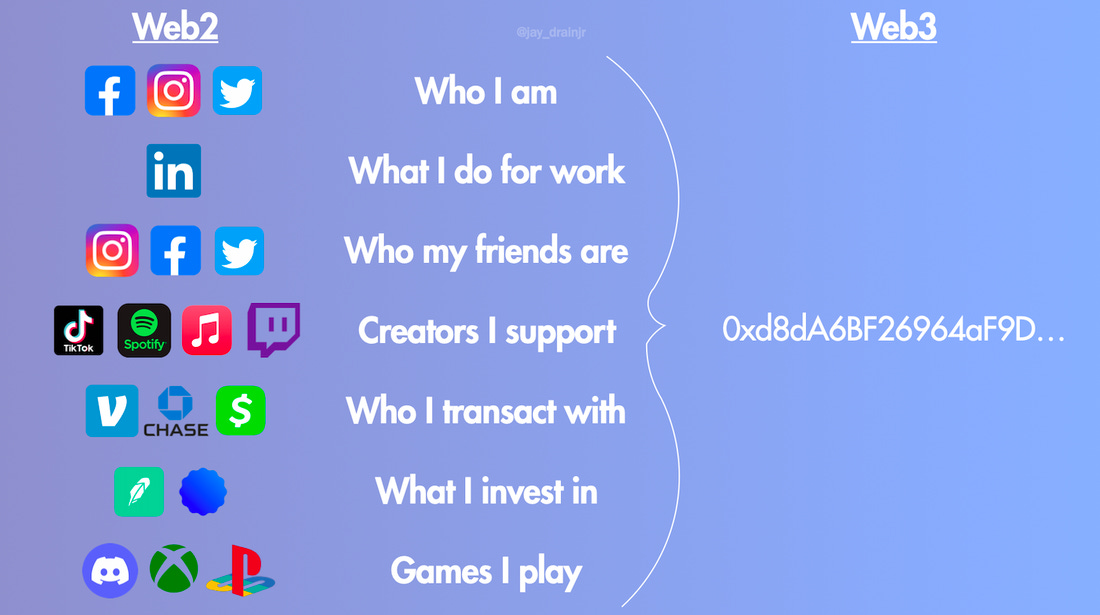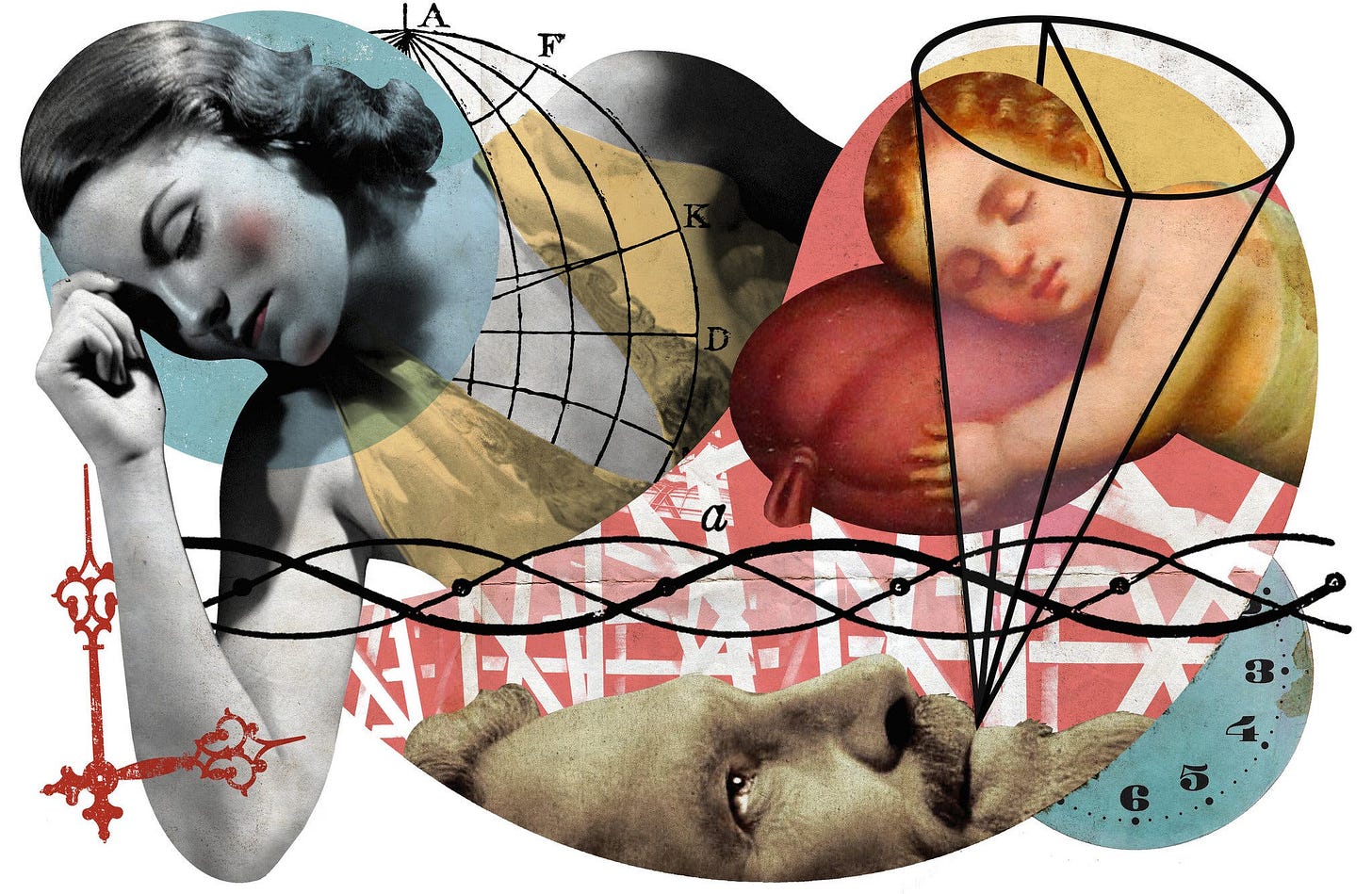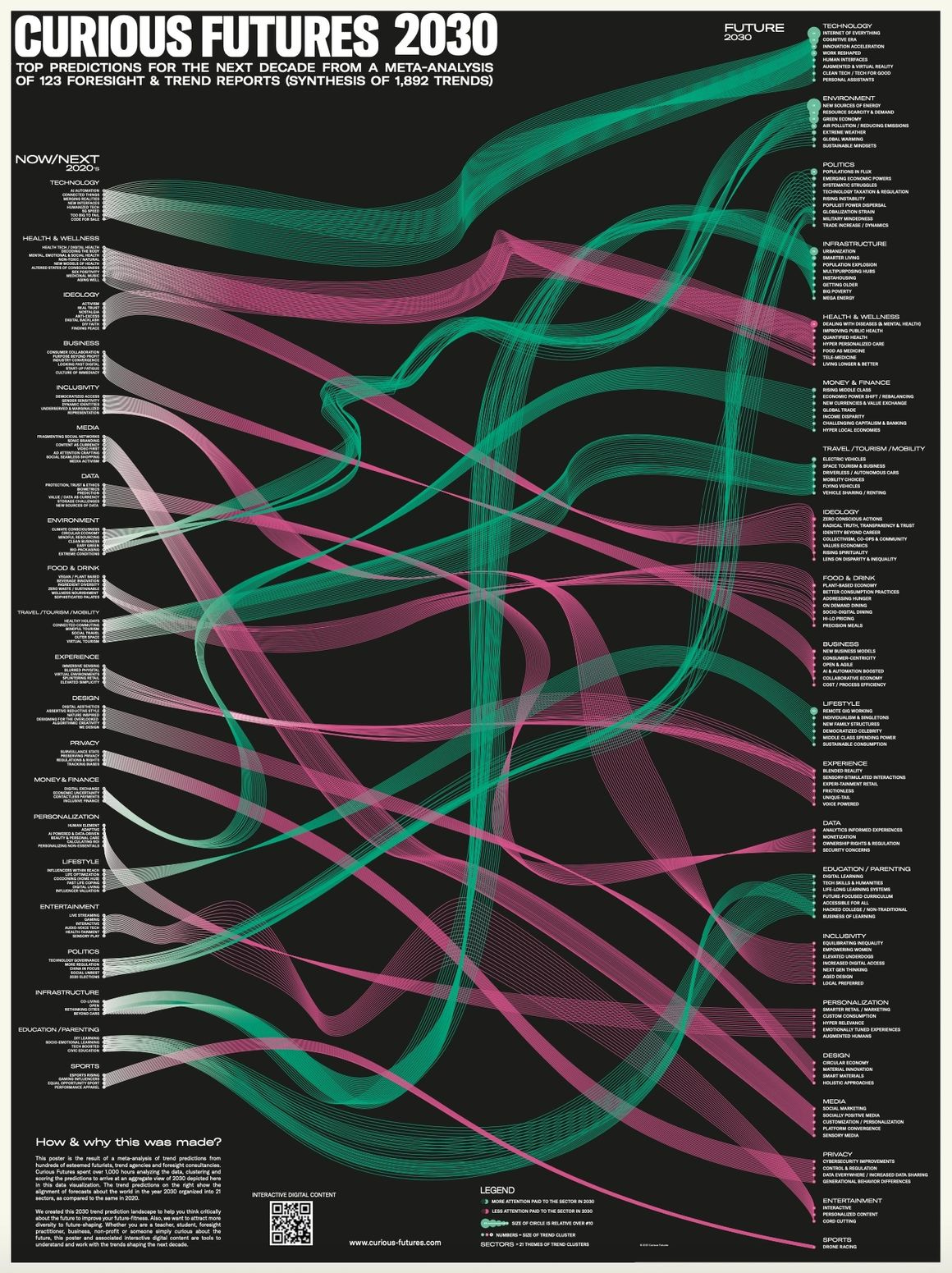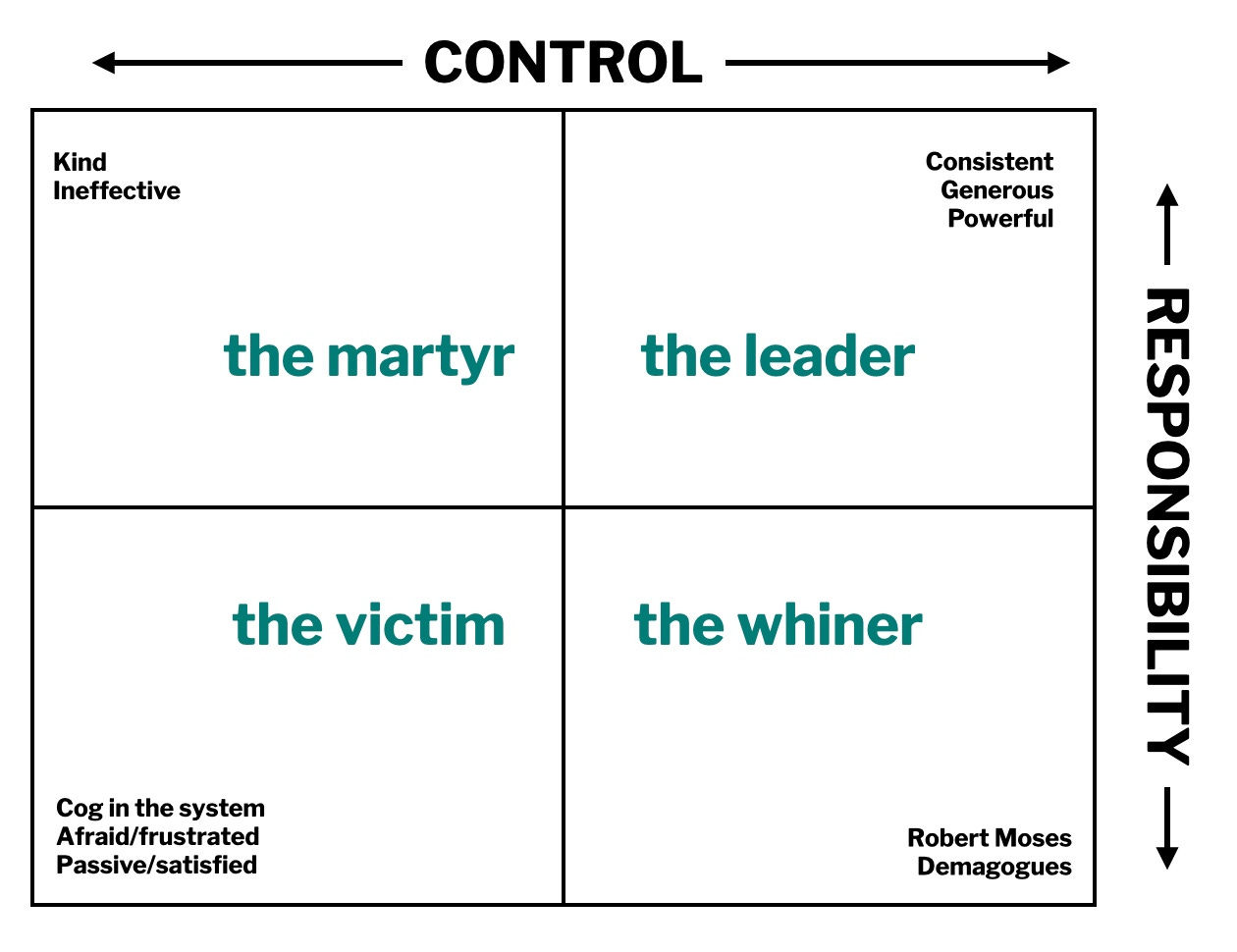💤✨The Nexialist #0055
The Woman of the End of the World | Types of Rest | Sleep as a Status Symbol | Pinterest Predicts | Curious Futures 2030 | Control x Responsibility Matrix | Transgender Emperor | Pseudonymous Identity
Welcome to your weekly review of serendipitous content that crossed my digital path, The Nexialist
Growing up, I was that child that would sleep anywhere. In the hair dresser, my mother had to hold my head while the job was done. The hairdressers were always amazed, because their experiences were usually more active. I also slept in the supermarket, even in those super uncomfortable metal chairs. Once I remember I woke up with my head hanging down. Today I’m not such an easy sleeper, but I just wanted to share these experiences as part of the sparks today are about rest and sleep (and for some reason I’m yawning as I finish this edition.) Enjoy!
🇧🇷The Woman of the End of the World
Last week, Brazil and the whole world lost one of our biggest and most meaningful voices. Elza Soares got the deserved title of “Voice of the Millenium” in 1999 by the BBC and left us, at age 91, with a beautiful and substantial body of work. She is known for her raspy voice, but also for being vocal against sexism, racism, violence, and injustice. She also was singing until the end. Two days before she was taken by natural causes, she was recording a concert in the Municipal Theater of São Paulo.
Her last three albums, which form a trilogy, mirror a convoluted country. But they also point to fresh routes in society and music – from fusions of samba with rap, to electronic textures. They are full of passion and drama that Soares drew from her life story, and an unbeatable hunger for disobeying what was prescribed for her. Elza Soares did not just embrace the revolutionary, liberating countercultural spirit in Brazil as the 20th century became the 21st – she was that spirit.
Read: Elza Soares: samba’s greatest star epitomized the vivacious spirit of Brazil by Felipe Maia | The Guardian
🧠Types of Rest
After the facial paralysis hit me in October, my doctor told me that I had to “rest and avoid stress”. I have to say that I caught myself questioning the meaning of rest, since I had just come back from a family trip in which I thought I was resting (and I was, from work), but I had other things to worry about. This week, my friend Roel sent me this link which is super helpful with 7 types of rest that every person needs: Physical, mental, sensory, creative, emotional, social, spiritual. You know when you’re in a guided meditation or yoga and they tell you to relax muscles you were not even aware you were flexing? Here it’s the same… just by bringing awareness to these different kinds of rest will help me for sure better understand the meaning of rest in different moments.
Have you ever tried to fix an ongoing lack of energy by getting more sleep — only to do so and still feel exhausted?
If that’s you, here’s the secret: Sleep and rest are not the same thing, although many of us incorrectly confuse the two.
We go through life thinking we’ve rested because we have gotten enough sleep — but in reality we are missing out on the other types of rest we desperately need. The result is a culture of high-achieving, high-producing, chronically tired and chronically burned-out individuals. We’re suffering from a rest deficit because we don’t understand the true power of rest.
Read: The 7 types of rest that every person needs - Saundra Dalton-Smith MD. - TED Ideas
💤Sleep as a Status Symbol
Even though this piece is from 2017, I have to say I think about it quite frequently. Penelope Green lists a bunch of companies and startups that are part of the sleeping industry space: meditation classes, products, apps, courses.
If sleep used to be the new sex, as Marian Salzman, a trend spotter and chief executive of Havas PR North America, proclaimed 10 years ago, today it is a measure of success — a skill to be cultivated and nourished — as a “human potential enhancer,” as one West Coast entrepreneur told me, and life extender.
While I’m reading, all I’m thinking is: who has time to sleep today (and sleep well and the recommended hours)? Also, when did sleep become a skill that we have to learn how to do? It reminded me of Byung-Chul Han’s The Burnout Society and Jonathan Crary’s 24/7 - Late Capitalism and the Ends of Sleep.
Read: Sleep Is the New Status Symbol By Penelope Green - TNYT
🔮Pinterest Predicts
One of my favorite reports every year is Pinterest Predicts, just because it’s fun and visually translates the imagination and wishes for a lot of people. It’s easy to browse through, so just go for it. Of course there is one about sleeping: Lounge-erie.
🔭Curious Futures Meta Trends 2030
If you follow The Nexialist, you might see how this hits me on different levels: the meta approach, the visualization, the trends and the fact there is a printed poster. Yes: the synthesis of 1.892 trends of 123 different reports represented in one place. What stands out for me in a nutshell: In 2030, Technology takes first place, followed by Environment, Politics and Infrastructure. More than that, what stood out is the clarity of who is pushing these ideas.
Given the large sample size (123 reports) and the fact that the sources are cited and referenced repeatedly by Big Business, Wall Street, Silicon Valley, the media and governments, it's likely these predictions will be self-fulling. Futurists plant ideas that shape strategies and investment and this is a round-up of the most popular ideas that have been planted.
🕹Control x Responsibility Matrix
Seth Godin’s newsletter this week got to me with this simple control x responsibility matrix. I’ll remember that when my scared self feels like avoiding responsibilities.
In the top right is an ideal combination. Someone with control and authority who also takes responsibility when things go wrong. This creates a useful feedback loop, because they can actually do something about the problems they caused.
In the bottom right is a disaster waiting to happen. This is brittle megalomaniac, Robert Moses, the builder, who spent nearly a century paving New York while neglecting housing and other social justice issues, but never took responsibility for any of the effects of his work. People who grab control and avoid responsibility are often easily identified because they spend a lot of time whining.
🏳️⚧️Transgender Roman Emperor
I love Messy Nessy Chic’s blog: the “13 things I found on the web” I read every week. Also, I love the profiles they do of people whose stories maybe were lost in time (or purposefully erased due to prejudice). In this case, Elagabalus, a teenage emperor whose records show the desire to seek a sex reassignment surgery. He was later ostracized and punished by death, and historians usually put him in a box of decadence.
An 18th century English historian Edward Gibbon, wrote that Elagabalus “abandoned himself to the grossest pleasures with ungoverned fury.” Germany’s leading historian of Ancient Rome, Barthold Georg Niebuhr, said that “the name Elagabalus is branded in history above all others” because of his “unspeakably disgusting life.” An example of a modern historian’s assessment is Adrian Goldsworthy’s view that: “Elagabalus was not a tyrant, but […] incompetent, probably the least able emperor Rome had ever had.” Only archaeologist Warwick Ball describes Elagabalus as “innovative” and “a tragic enigma lost behind centuries of prejudice.”
Read: History Conveniently Forgot to Tell us about the Transgender Roman Emperor - Messy Nessy Chic
🙋Pseudonymous Digital Identities

Another education post from Rex Woodbury about our digital identities on the Web2 and Web3, with a new concept for me: pseudonymous digital identities. A couple of years ago, I participated on a project with Envisioning about identity and trust and learned about Self-Sovereign Identity, which is another application of our identities in the Web3. It’s impressive to see how fast this is evolving, though I must say I get lost on how to even get started in that world.
Pseudonymity is a core pillar of web3. Many of the highest-profile builders and developers and thinkers in web3 are pseudonymous—Gmoney, Punk 6529, 4156. I like how Jackson Dahl recently put it: “Pseudonymity allows identity to become contextual rather than fixed. In that regard, pseudonymity, unlike anonymity, is a spectrum and a vast design space.”
Read: Our Fluid, Multi-Faceted, Pseudonymous Digital Identities - Digital Native / Rex Woodbury
❤️If anything made your brain tingle, click like and don't hesitate to share it with the world. It helps The Nexialist to reach more curious minds. See you next week!🦦
🫀If you enjoyed this newsletter, please share it with your friends. If someone amazing sent it to you, tell them you love them, and you can subscribe at thenexialist.substack.com. If you want to know what a Nexialist is, click here.
🤙Call me…
If you like what you see here and your project, brand or business needs some ideas or inspiration from outside your bubble, maybe you need a Nexialist to help you out 🙋🏻♂️ I can participate in brainstorms and workshops, guide inspiration sessions, or provide you with creative research. You can always send me an e-mail to figure something out together.










